Smaller Firms Feeling Quasi-Tax Pinch
Smaller Firms Feeling Quasi-Tax Pinch
Posted September. 08, 2006 07:00,
Company A in Changwon, South Gyeongsang Province manufactures textiles used in shoes. It is a small business with yearly sales of about one billion won.
The official taxes this company pays each month are approximately two million won, including corporation taxes. However, quasi-taxes, that is, various mandatory expenses, insurance payments, and membership fees, add up to four million won, twice the amount of official taxes.
To begin with, the four major insurances payments, National Pension, Health Insurance, Unemployment Insurance, and Industrial Accident Compensation Insurance, are three million won per month, and the membership fees of the Association, an interest group of related businesses, also have to be paid regularly. Occasionally, sponsorship fees for the exhibitions in which the large companies that buy their products participate in must be coughed up.
Representative Jang (61) of this company confided, Ive often thought of moving the factory to a foreign country, just to avoid quasi-tax expenses.
There is even a loan product soon to be offered by banks for companies struggling with quasi-taxes. The Industrial Bank of Korea announced on September 7, Small and medium enterprises are having a hard time managing their businesses due to various quasi-taxes that have to be paid on top of regular taxes. Were planning on launching a low interest loan product for these businesses within the year.
Small and medium enterprises can get a loan by submitting recent quasi-tax details and receipts.
If the bank decides that the business has a heavy load of quasi-taxes, the yearly loan interest will be cut 0.5 percent point.
Such quasi-tax loans are a first in Korea and very rare in the world.
An employee of Industrial Bank said, This is the bare truth. If you actually go visit the industries, you can see how much difficulty these quasi-taxes are causing them.
Because these quasi-taxes are not based on law, it is comparatively easy to create and manage them, and they are often said to cause a rise in manufacturing prices as an unnecessary financial burden.
According to recent research results by the Korea Institute of Public Finance, quasi-taxes, such as various mandatory expenses and fees, that were imposed on businesses summed up to a yearly total of 10 trillion won without adding insurance payments.
In a survey this March, the Industrial Bank asked CEOs of top small and medium enterprises what needed the most urgent reform among restrictions; 60.4 percent answered taxes and quasi-taxes.
Another survey by the Korea Federation of Small and Medium Business on 270 small and medium manufacturing companies showed that 49.1 percent, nearly half, responded, Quasi-taxes are a big burden.
jarrett@donga.com



![“한동훈, 정치생명 걸고 무소속 출마해 평가받는 것 고려할만”[정치를 부탁해]](https://dimg.donga.com/c/138/175/90/1/wps/NEWS/IMAGE/2026/01/19/133186982.1.jpg)


![[한규섭 칼럼]왜 여당 지지율은 떨어지지 않는가](https://dimg.donga.com/c/138/175/90/1/wps/NEWS/IMAGE/2026/01/19/133189257.1.png)
